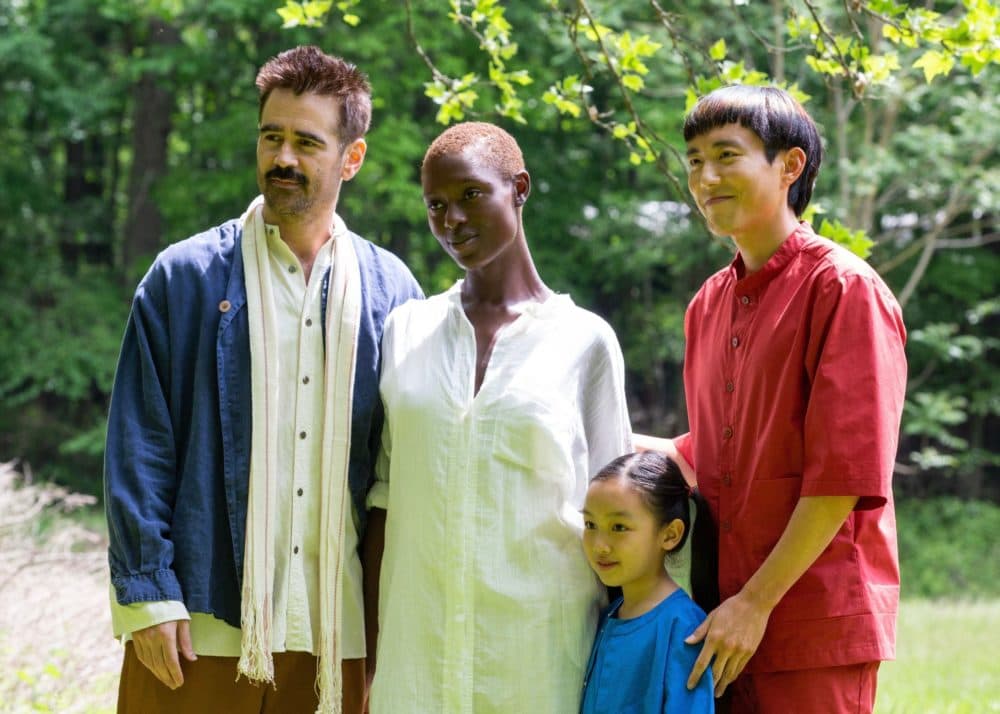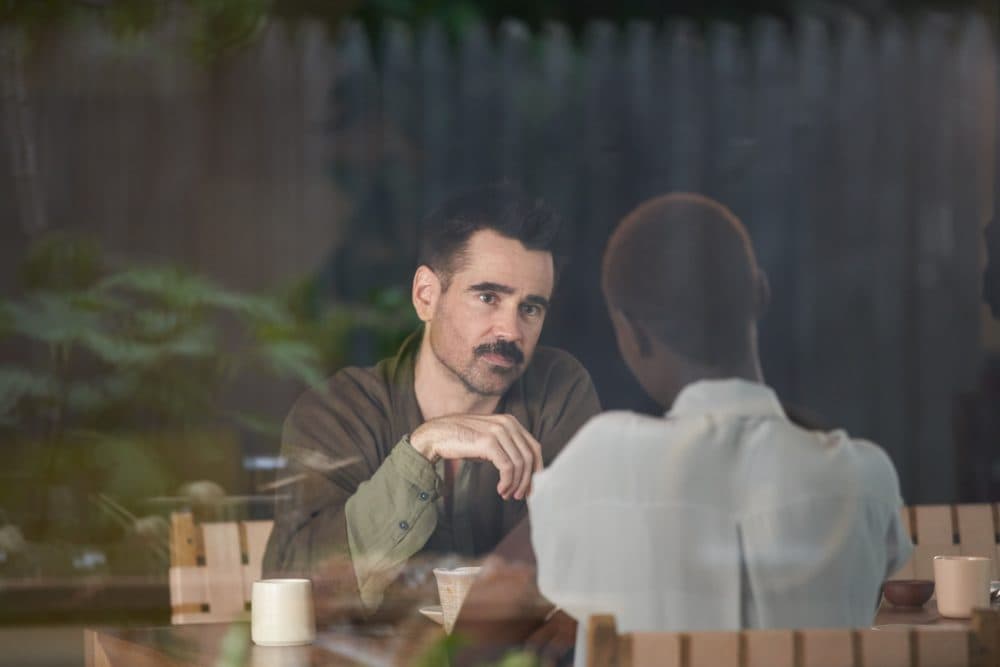Advertisement
'After Yang' addresses grief, alienation and the unexpected humanity of a robot

Editor's Note: This segment was rebroadcast on Aug. 31, 2022. That audio is available here.
“After Yang” takes place in the near future in a time when clones and robots are common in everyday life.
The film centers around a family whose robot companion Yang has broken down in almost every way. Yang appears to be human, and their daughter Mika is inconsolable with grief at the thought of losing Yang.
The father, Jake, played by Colin Farrell, first sees Yang as nothing more than a machine that needs a mechanic. But as Jake soon discovers, Yang had humanlike depths he had never realized were possible.
Writer and director Kogonada adapted this film from a short story. As a science fiction fan himself, Kogonada says he wanted to explore a more grounded and relatable story in the genre.
“After Yang” is about family, alienation and dealing with loss — all topics Kogonada wrestles with, he says.
This quiet film vastly differs from the special effects and world-building that many science fiction movies feature.
“When I watch sci-fi, I have always wished that there was like a slice of life sci-fi that wasn't about saving the world or some hyper event,” he says. “But it was how people in the future are getting through a day or getting through in this case, something that is broken and ultimately something that is lost.”
For star Farrell, “After Yang” is different from the science fiction he’s done in the past. Farrell says he was drawn to the issues of alienation, loss and grief — which he found disturbing upon reading the script.
Advertisement
“I had to take a break around page 30 or 40, I can’t remember, and go and put the kettle on and make a cup of tea,” Farrell says, “because I was so stirred by what I was reading. It went in very deep, very quickly.”
As the film progresses, the family starts to realize that they have feelings of love for Yang, despite the fact that he's a machine. It’s about the discovery of love, Kogonada says, rather than the loss and grief that comes with a tragedy like losing a child.
“Part of [Jake’s] journey is recognizing how special Yang was and how much he actually meant to him,” Kogonada says. “And it's through the eyes of Yang, he realizes his own family. You know, he realizes his own daughter in a way that he was sort of missing out on.”

Interview Highlights
On whether humans are headed toward feeling complex emotions about technology
Colin Farrell: “I can see it in my personal life. I can see it in my children's use of technology, even if it's just the iPad or the iPhone or how they apply themselves to certain apps. It may not be love, but there's a certain kind of a need, a certain leaning into. There's a kind of a structural introduction of a new system into the lives of a family. And whereas Yang in this film began as a purchased robot to be a surrogate brother to our adopted daughter, there's a certain amount of surrogacy that's taking place. I'm guilty of it myself when I let my kids play the iPad because I need 20 minutes or I need 30 minutes. I think the future is going to give us ways in which to shake off some of the burdens of our responsibilities, and I don't know that that's always a good thing.
“And I think science and technology is making things in life, certain day-to-day things, very easy for us, and I think we have to be suspicious. I have to be suspicious of that and ask exactly what I intend to do when I lean into technology. I think that's something that Jake, the character I play, is very guilty of. He has really leaned on Yang, used Yang as not only a surrogate brother as he was intended to the daughter, but also a surrogate parent in a way, and it's allowed Jake to step away from his wife, his daughter and the family unit, so there's a return to the virtues of what is beautiful around him through recognizing how in a way, how human Yang was because of the perspective Yang had on their family life is a perspective that Jake should actually have what he has kind of let go of in the preceding years.”
On how this modern story about family and identity resonates
Kogonada: “It's very central to my being right now because I too am a father, and it was such an existential transformation that felt like I was drifting most of my life and suddenly felt attached and vulnerable, but also as alive and suddenly the smallest things felt very meaningful. So I was writing as someone who was sort of in the middle of it and trying to process, you know, what it means to be a father, the realm of even identifying as a family.”
On how Yang tries to understand what it means to be Chinese and the search for identity
Kogonada: “The fact that Yang is not really Asian but a construct of Asianess was something that I was surprised how much I related to — the idea of this constructed sense of Asianess. As someone who was born in Korea but lived most of my life in America, I struggle with what it means to be Asian, if I'm Asian enough, if I'm American enough, and in some ways it's this presentation of what those identities mean. And as I was writing it, you know, I suddenly was like, ‘Wait a minute, you know, I'm assuming that he's Asian, but of course he's not.’ He's this manufactured version of Asianess. And it was really something to mine and really, even in my personal life, beyond the story, it's something that has stayed with me trying to get a sense of my own identity.”
On the origins of Kogonada’s name
Kogonada: “Without saying too much about it, it represents a lot of things. My father grew up in Japan and his own struggles with his identity and what he passed down to us and the tensions between his own identities. So there's something in there. And it's also partly a tip to a filmmaker that had really helped me in understanding my place in the world or at least a start of it, you know, so I don't want to say too much outside of that. It's meaningful to me. And also it creates a sense of privacy for me that I value.”
On Farrell starring as Penguin in “The Batman,” which hits theaters the same day as “After Yang”
Farrell: “They're two films I thoroughly enjoy doing, man. I mean, one was a lot more personal for some of the reasons that were touched upon in this conversation. 'After Yang' did feel like a very personal film to me and did feel like an exploration of concerns and considerations that I have been jostling with and will continue to jostle with throughout my life. And then the other one, the Penguin in 'The Batman' was a lot of fun. I mean, you still, of course, tried to ground everything you do in a discernable reality or relatability, but it was a lot of fun.
“Yeah, one was burying myself into the character, literally and also psychologically with the Penguin and the other one was kind of more revelatory. It was certainly closer to me, 'After Yang.' But at the center of it, you're still just you bringing stories to life. And however each job and each character presents itself differently, the experiences [are] always somewhat the same. Fundamentally, you're still reaching for an idea you're aspiring to connect and to relate. But yeah, it's fun. It's fun is the simple answer to your question. It's actually exciting because I like both of the films, and I'm really proud to be a part of both of them, to be honest with you, man.”
Emiko Tamagawa produced and edited this interview for broadcast with Jill Ryan. Allison Hagan adapted it for the web.
This segment aired on February 28, 2022.

